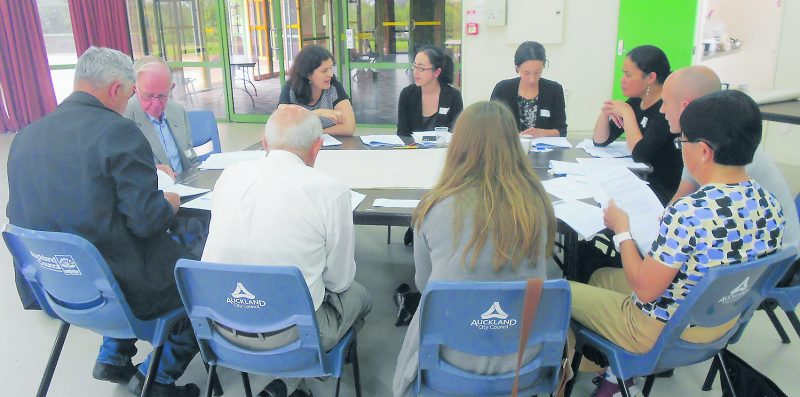by BEATE MATTHIES
Should you spend more money than you have, you may have to ask for a loan — from a friend, a family member, a bank or another lending institution.
Once you have contacted a lender who is willing to lend you money, terms will have to be drawn up with conditions about the period of time, the interest rates and the penalties for nonpayment on time. This sounds logical and reasonable.

Members of the Auckland District Council of Social Services discuss the issue of responsible lending on November 25.
However, usury results in misfortune for the vulnerable who have no choice but to accept any conditions, no matter how unfair, that are imposed on them. It is a fact that the less money one has,
the more interest one has to pay for borrowing.
In recent years in New Zealand, there have been more and more cases of moneylenders demanding
exorbitant interest rates. This has impacted especially on those who find it difficult to obtain credit from the banks, and is a vicious circle that is difficult to break.
The Government is developing the “Responsible Lending Code” and the Ministry of Business, Innovation and Employment (MBIE) has been asking for suggestions and submissions from the public.
ADCOSS, the Auckland District Council of Social Services, held a workshop on responsible lending on
November 25. Three representatives from MBIE gave an opening presentation followed by Matt Halsey from Good Shepherd NZ (microfinance project manager).
MBIE has taken the first step towards reasonable lending practices.
The prepared guidelines outline binding lending principles for responsible lending. The main focus is on collecting information about the borrower. If a borrower cannot afford to repay, he or she should not be able to borrow and accumulate more debts.
One of the innovative options for those who are unable to access finance from a reputable source is the Good Shepherd NZ Microfinance model. The Good Shepherd Sisters started a “No Interest Loan Scheme” in Australia in 1981, focusing mainly on loans for essential household items. Those small loans were given without charging interest.
With contributions to the operational funding and pilot evaluation of the Ministry of Social Development, Good Shepherd NZ started in south Auckland. This project could grow and spread to other parts of the city or across New Zealand.
Two speakers set the scene for a following panel discussion and workshops. Peter Young from Home & Budgeting Services in East Tamaki gave insight into the daily experience of budget advisers. He expressed his concerns when interest rates reach 29.5 per cent a year or more, as this means for many
families unacceptable cuts to the family food budget.
Unfortunately, interest rates for “high-cost short-term credit” often include incredible conditions. He gave an example of an interest rate of 498 per cent a year.
Many people often don’t understand what the penalties could be if they cannot repay in time. Contracts were not explained to them.
Whoever signs a contract at these conditions must be misled, misinformed or absolutely desperate.
Although Mr Young welcomed the Government’s approach on responsible lending, the concern about responsible borrowing stays unanswered: “Surely it is not responsible to loan money to the poorest of our families at interest rates ranging from five times to 100 times the rate that you and I can borrow at?” he asked.
Peter Garrick, the convener of the Protection from Exploitation and Social Hazard Committee of the Auckland Catholic Justice and Peace Commission, agrees with Peter Young.
He came up with possible improvements, such as more financial literacy taught in schools and a 24-hour stand down period of due diligence for the purposes of securing budgeting or legal advice on the implications of the credit contract.
Some of the concerns coming from the workshops were a lack of control on interest rates and the safety of the information given to lenders. Transparency is needed for both sides.
Television ads that promote easy borrowing and showing what you can buy with credit are prevalent — but what about the pictures on what happens if you cannot repay your loans?
Maybe we need a campaign like the one against drink driving?
Prevention is always better than healing: Teach children to save money and how to operate a bank account, and provide education for everyone around the value of money.
• The deadline for submissions on the Responsible Lending Code is December 24, 2014.

[…] This article was printed in NZ Catholic. […]